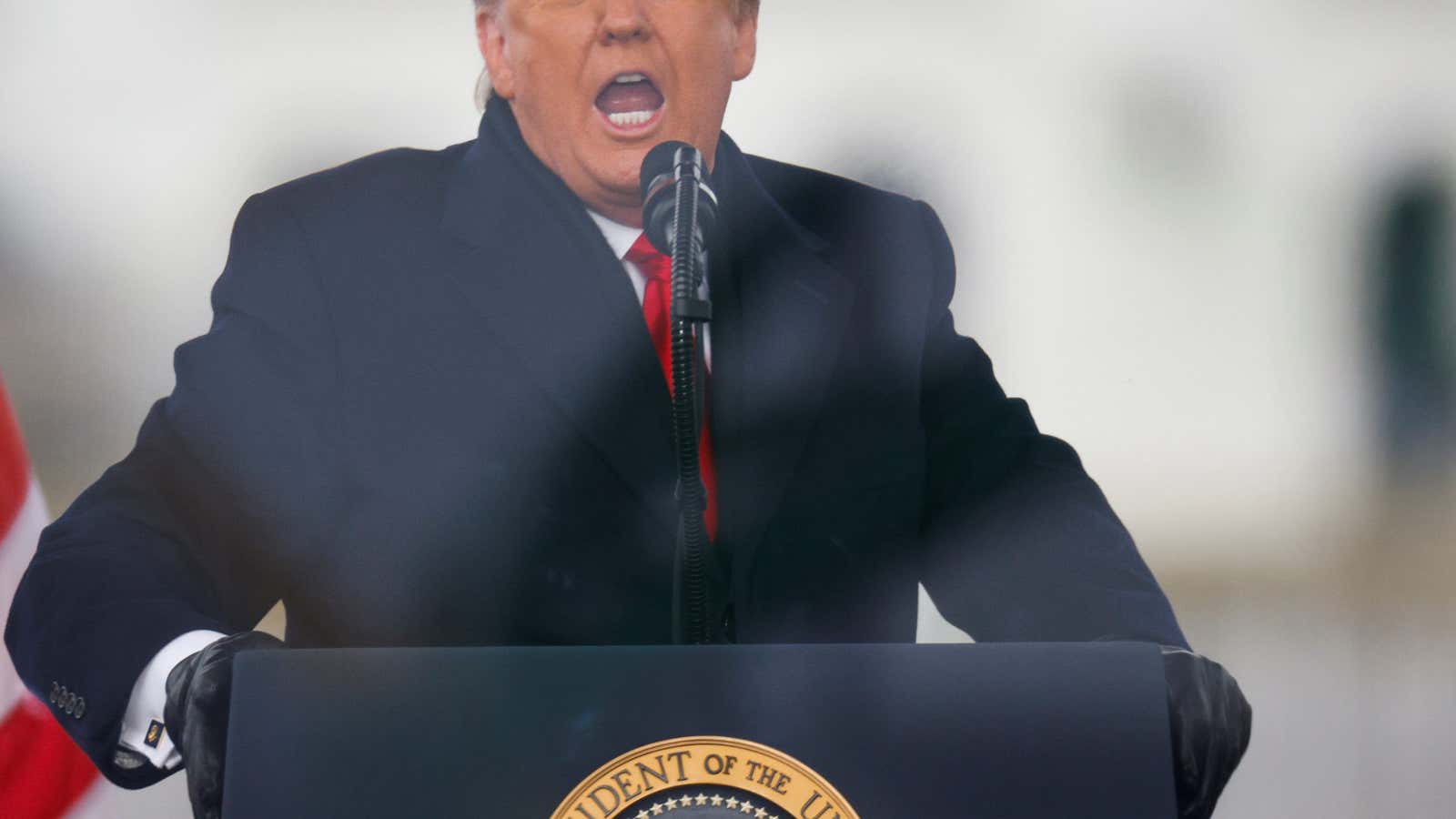It’s official: There will never be another Facebook post from US president Donald Trump.
On Jan. 7, Facebook CEO Mark Zuckerberg announced that Trump’s account would be suspended for at least two weeks, meaning Trump will no longer be president if or when his access is restored.
Facebook first suspended Trump’s account on Jan. 6, hours after a mob of his supporters invaded the US Capitol, sending lawmakers in the process of certifying Joe Biden’s election victory running for cover. Trump had posted a video to Facebook in which he spoke to the terrorists, saying “I love you,” before telling them to go home. He also repeated the same baseless claims about election fraud that he and his Republican enablers have been circulating since November.
Zuckerberg explained the company’s decision to extend its suspension until at least the time at which the transition to new leadership is complete, writing:
The shocking events of the last 24 hours clearly demonstrate that President Donald Trump intends to use his remaining time in office to undermine the peaceful and lawful transition of power to his elected successor, Joe Biden.
His decision to use his platform to condone rather than condemn the actions of his supporters at the Capitol building has rightly disturbed people in the US and around the world. We removed these statements yesterday because we judged that their effect — and likely their intent — would be to provoke further violence.
Zuckerberg also said that “the risks of allowing the President to continue to use our service during this period are simply too great.”
Biden takes office on Jan. 20.
Facebook wrestles with its own culpability
Despite taking action now, Zuckerberg will likely never escape questions about his decision to let Trump stay on the platform for nearly his entire time in office.
In June, hundreds of Facebook employees held a virtual walkout to express their frustration with the company’s hand’s off policy toward the president’s posts, which at that time encouraged violence against peaceful protesters of the Black Lives Matter movement. On Facebook, Trump had declared that “looting” would lead to “shooting,” which arguably should have been enough to permanently suspend his account then.
“Zuck has told us over and over that calls to violence would not be tolerated on the platform, even if they were by the president of the United States,” a former employee who quit after that incident told CNN.
Facebook’s refusal to better control and eliminate racist hate speech by Trump’s far-right supporters, and to cleanse the platform of political ads created to meddle in US elections, have also caused internal strife. Several board members, including Kenneth Chenault, former chairman and CEO of American Express, cut ties with Facebook, reportedly because Zuckerberg would not change course.
On Jan. 6, in the middle of the extremist-led insurrection, Facebook’s former chief security officer, Alex Stamos, called for Zuckerberg to block Trump’s account. BuzzFeed, meanwhile, reported that Facebook management had silenced discussion among employees who were urging the company to “take down [Trump’s] account right now.” (Twitter, Trump’s favorite medium, locked his account and blocked him from tweeting for 12 hours.)
In his latest announcement, posted on his own Facebook page, Zuckerberg explained the contentious position that Facebook took regarding Trump’s posts. “Over the last several years, we have allowed President Trump to use our platform consistent with our own rules, at times removing content or labeling his posts when they violate our policies,” he wrote. “We did this because we believe that the public has a right to the broadest possible access to political speech, even controversial speech.”
It was a belief that Zuckerberg, often described as being dangerously confident in his own convictions, held fast to even as employees, lawmakers, and even Facebook’s advertisers condemned the company for not better policing the speech on its platform.
Just like the Republican officials chastened enough by yesterday’s events to abandon their baseless accusations of election fraud, Zuckerberg is now rethinking his approach. It only took a disturbing show of violence in the Capitol that left four people dead, shook the nation, and cemented the culpability not just of Trump and his violent disciples but of everyone, and every platform, that enabled them.
